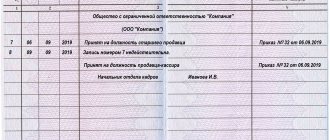Absenteeism is an absence from the workplace without a valid reason for the entire working day or a significant part of it (at least 4 hours). It can be short-term (up to one day) or long-term (any other period). Absenteeism without a valid reason is a clear basis for dismissal. In order to quickly and without the possibility of return to part with a negligent employee, you need to carefully comply with all the requirements for this procedure and draw up documents as carefully as possible.
Legal grounds
An employer may decide to dismiss a truant worker, guided by Article 81 of the Labor Code of the Russian Federation. It states that the minimum period of absence from the workplace, which can entail such consequences, is 4 hours. Judicial practice significantly clarifies the list of grounds for making such a strict decision:
- Absence from work without good reason;
- Staying outside the workplace for more than 4 consecutive hours during the working day;
- Leaving work without warning the employer (for employees on open-ended employment contracts) or leaving work before the expiration of the employment contract (for those who entered into such a contract);
- Unauthorized going on vacation, using time off, etc.
Separately, it is worth emphasizing the wording “absenteeism from work without a good reason.” Judicial practice shows that employees fired for absence are often reinstated in their employment rights if they can prove that they did not show up due to serious problems and circumstances.
Thus, the courts clearly include among the “good reasons”:
- Poor health, confirmed by a certificate of visiting a doctor (calling an ambulance, calling a doctor at home, etc.);
- Illness of the child (also documented);
- Funeral of relatives;
- Road traffic accidents;
- Carrying out emergency work in an apartment, for example, in case of a water pipe break (confirmation from housing and communal services is required);
- Participation in court proceedings or serving administrative arrest;
- Absenteeism after the expiration of a two-week period after submitting the application to the manager “at his own request”;
- Traveling to and from school;
- There is a delay in wages of more than 15 days.
In any controversial or ambiguous situation, the employer must prove the fact of absenteeism. Accordingly, dismissal due to absenteeism is possible only if there is indisputable confirmation of such a violation of labor discipline. The absence of a person for more than 4 hours must be documented; a special act is drawn up for this purpose.
Under no circumstances may an employee on sick leave or vacation be dismissed on this basis. This option does not apply to pregnant women.
Still have questions?
Fill out the form and our expert will contact you!
Truancy concept
From the point of view of the law, absenteeism is the absence of an employee from the workplace for 4 hours without a valid reason. Particular attention should be paid to the wording “without a good reason”, since most disputes and litigation lie precisely in this. The Labor Code makes an attempt to resolve this controversial issue in a documented manner. It spells out situations that are considered a valid reason for missing work:
- Incapacity for work due to health conditions, which is documented. In other words, a person must ensure that he has a medical certificate confirming his state of health for the period during which he was absent from work.
- Absence from work due to public or government work. In this case, a certificate is always issued, so problems usually do not arise.
- Passing a medical examination. The same certificate will help you defend your rights. In addition, we are talking about routine medical examinations that are related to professional activities, so the company’s management is usually aware of such things.
- Donation of blood and its components. The fact of donation must be documented. The donor is entitled to a day off work the day after donating blood.
- Being in custody. Some points of administrative or criminal liability may serve as a reason for the immediate dismissal of an employee from his position. But the mere fact of absence due to detention does not constitute truancy.
- Participation in rallies and strikes. We are talking only about agreed and official events, so you should be careful and carefully study the regulatory framework.
- Emergency situations that prevented you from getting to your place of work or prevented you from being at the workplace. The most realistic and simple examples would be a bus breaking down or a flight being cancelled. In this case, the employee will have to go for a certificate confirming this information. Management has the right to require such a document.
- Delay in salary to an employee for more than 15 days. If an employee does not receive monetary compensation for work performed within 15 days, then he can go to court and stop going to work.
- Vacation period. It is possible to call an employee out of the legal period for rest only with his written consent. Refusal to go to work cannot be interpreted as absenteeism.
- Refusal to work overtime is not a reason for dismissal, since these days or hours are not marked in the schedule.
- Refusal to perform work that is contraindicated for medical reasons. A similar situation is possible when trying to transfer an employee to another site. To confirm the words, the employee must present a medical report.
The employer and employee need to consider some additional facts. These include the situation with lunch time, which is not considered working time. Therefore, it is important to carefully read the employment contract, find out how many absences can lead to dismissal under the article and in what cases.
Algorithm of actions when registering dismissal
It is certainly worth finding out why the person did not come to the office or was absent for more than half the working day. Perhaps this is not the result of irresponsibility, but a consequence of serious life difficulties.
If management is confident that the employee’s absenteeism occurred without a good reason, the employment relationship can be terminated.
This must be done in stages.
- Identify and record the fact of absence from work. The head of the enterprise must be notified about this in writing, using a memo. The report card for that day contains a mark indicating absence for unknown reasons - “NN”.
- Draw up an act. This document must be drawn up on the same day when the employee’s absence is discovered. It correctly and accurately indicates the number of hours of absence. If the truant is absent for more than a day, reports must be drawn up every day. It is certified with their signatures by at least three employees who have the absentee in their field of vision and can accurately confirm that he was not there at the specified time.
- Demand an explanation. It is better to put the demand in writing and hand it to the violator against signature. If he refuses to accept the document, draw up an appropriate act. The demand can also be sent by mail with acknowledgment of receipt. In addition, it would not be superfluous to use other available means of communication: e-mail, WhatsApp.
- Receive explanations or record their refusal. The violator is given two days to do this from the date of receipt of such a request. During this time, he is obliged to explain his absence in writing and provide evidence of valid reasons.
- Conduct an internal investigation. This is necessary if the offender does not communicate or has provided a dubious reason for absence. Sometimes commissions are created for these purposes. All the circumstances that were found out are indicated in a special act.
- The manager needs to make a decision. In addition to dismissal, these may be methods of disciplinary action: reprimand, reprimand. The employer formalizes his decision in a submission.
- Carry out dismissal. The manager can make such a decision within a month from the date of discovery of the misconduct. The manager must issue the appropriate order, familiarize the absent person with it, issue a work book and make a full payment. In this case, the last day of work is considered to be the day preceding the absence.
When dismissal for absenteeism without a good reason, in the entry in the work book, you must refer to subparagraph “a” of paragraph 6 of Article 81 of the Labor Code of the Russian Federation. Upon settlement, the employee receives all payments due to him, including compensation for unused vacation.
Court decision of January 28, 2020: dismissal for absenteeism (lunch does not interrupt a 4-hour absence from work)
Share
You remember, right? An employee can be fired for absenteeism, that is, for absence from the workplace without good reason throughout the entire working day (shift), regardless of its duration, as well as in case of absence from the workplace without good reason for more than four hours in a row during working day (shift) (clause “a”, clause 6, part 1, article 81 of the Labor Code of the Russian Federation).
Spears break in the courts because of the wording “more than four hours in a row”, and there are different court decisions.
Here, for example, the court noted that a lunch break does NOT interrupt working hours, so the employee was correctly fired for absenteeism, due to being absent from work for 4 hours and 45 minutes.
What I would like to note. The defense tried to make an argument about the illegality of dismissal for absenteeism due to the fact that the plaintiff was a single mother raising a child under the age of 14, without providing a link to the substantiation of her argument.
Open part 4 tbsp. 261 of the Labor Code of the Russian Federation, we read: “Termination of an employment contract... with a single mother raising a disabled child under the age of eighteen or a young child - a child under the age of fourteen,... at the initiative of the employer is not allowed ( except for dismissal on the grounds provided for in paragraphs 1, 5 - 8 , 10 or 11 of the first part of Article 81 ...). Thus, it is not prohibited to fire this category of workers for absenteeism.
I also believe that the court’s decision was influenced by the fact that the employee had previously been disciplined for absence from work 4 times, and she did not challenge them, i.e. agreed.
Appeal ruling of the Investigative Committee for civil cases of the Supreme Court of the Republic of Bashkortostan dated January 28, 2021 (case No. 33-1949/2020)
Judicial Collegium for Civil Cases of the Supreme Court of the Republic of Bashkortostan, consisting of:
presiding Gadiev I.S., judges: Abdrakhmanova E.Ya., Rakhmatullina A.A., with secretary Rakhimov D.M., considered in open court a civil case on the appeal of the High Court of Justice against the decision of the Kirovsky District Court of the city of Ufa of the Republic of Bashkortostan dated.
Having heard the report of the judge of the Supreme Court of the Republic of Bashkortostan E.Ya. Abdrakhmanova, the judicial panel
INSTALLED:
VYU filed a lawsuit against the Federal State Budgetary Educational Institution of Higher Education "USATU" for reinstatement at work, collection of arrears of wages, and compensation for moral damage.
In support of the claim, indicating that from the date he is in an employment relationship with the Federal State Budgetary Educational Institution of Higher Education "USATU" in the position of office cleaner (1st category) OXO academic. cor. N... From date the plaintiff was transferred to the position of commandant of the 11th corps due to a reduction in the staff of cleaners. When registering the transfer, VAL asked to transfer her to the position of accountant, since she has the appropriate education and experience, but she was refused due to the absence of a category entry in her work book. Having started work as a commandant, the plaintiff performed her duties in full. By order dated VAYU was dismissed under paragraphs. “a” clause 6, part 1, art. 81 of the Labor Code of the Russian Federation for absenteeism. The plaintiff believes that the reason for his dismissal was personal hostile relationships with colleagues. date VAYU was absent from work due to attending an event dedicated to the beginning of the school year at her child’s school. During her absence, no serious consequences occurred due to her fault. In addition, the cost of time worked for the event was withheld from the plaintiff - 761.19 rubles. and a quarterly incentive bonus.
Based on the above, the plaintiff asked the court to reinstate her in the position of commandant, followed by transfer to the position of accountant with a probationary period of 3 months, to recover from the defendant in her favor wages for the period of forced absence; arrears of wages for the 2nd quarter in the amount of 50% of the basic salary, withheld overtime in the amount of 761.19 rubles, to recover compensation for moral damage in the amount of 100,000 rubles.
By decision of the Kirovsky District Court of Ufa, dated:
partially satisfy the claim of the Vayu.
To recover from the Federal State Budgetary Educational Institution of Higher Education "USATU" in favor of VAYU wages for overtime work in the amount of 761.19 rubles, compensation for moral damage in the amount of 5,000 rubles; total to recover - 5,761 (five thousand seven hundred sixty-one) rubles. 19 kopecks
The rest of the claim is to be denied.
To collect from the Federal State Budgetary Educational Institution of Higher Education "USATU" to the local budget a state duty in the amount of 700 (seven hundred) rubles.
Disagreeing with the court's decision, the Supreme Court filed an appeal, in which she asks the court to change the court's decision, satisfying her claims in full.
Persons participating in the case are duly notified of the date and time of the court hearing.
The persons involved in the case were also notified publicly by posting information in advance about the time and place of consideration of the appeal on the website of the Supreme Court of the Republic of Bashkortostan in accordance with Art. 14 and 16 of the Federal Law of December 22, 2008 N 262-FZ “On ensuring access to information about the activities of courts in the Russian Federation.”
The persons who did not appear did not report the reasons for the excused absence, and therefore, guided by Art. Art. 167, 327 of the Civil Procedure Code of the Russian Federation (hereinafter referred to as the Civil Procedure Code of the Russian Federation), the judicial panel believes it is possible to consider a civil case in the absence of persons who failed to appear.
Having studied the case materials, discussed the arguments of the appeal, listened to the High Court of Law, the representative of the Federal State Budgetary Educational Institution of Higher Education "USATU" - ShAF, the conclusion of the prosecutor Muratova E.M., having checked the legality and validity of the court decision in accordance with the requirements of Part 1, Part 2 of Article 327.1 of the Code of Civil Procedure of the Russian Federation , the judicial panel comes to the following.
According to Art. 22 of the Labor Code of the Russian Federation, the employer has the right to conclude, amend and terminate employment contracts with employees in the manner and under the conditions established by this Code and other federal laws.
By virtue of Art. 192 of the Labor Code of the Russian Federation for committing a disciplinary offense, that is, failure or improper performance by an employee through his fault of the labor duties assigned to him, the employer has the right to apply the following disciplinary sanctions: reprimand; rebuke; dismissal for appropriate reasons.
Before imposing disciplinary action, the employer must request a written explanation from the employee. If after two working days the employee does not provide the specified explanation, then a corresponding act is drawn up.
The employer's order (instruction) to apply a disciplinary sanction is announced to the employee against signature within three working days from the date of its publication, not counting the time the employee is absent from work. If the employee refuses to familiarize himself with the specified order (instruction) against signature, then a corresponding act is drawn up (Article 193 of the Labor Code of the Russian Federation).
In accordance with paragraphs. “a” clause 6, part 1, art. 81 of the Labor Code of the Russian Federation, an employment contract can be terminated by the employer in cases of a single gross violation by the employee of labor duties: absenteeism, that is, absence from the workplace without good reason throughout the entire working day (shift), regardless of its duration, as well as in case of absence from the workplace without good reason for more than four hours in a row during a working day (shift).
As follows from the explanations given in paragraph 23 of the Resolution of the Plenum of the Supreme Court of the Russian Federation dated March 17, 2004 No. 2 “On the application by the courts of the Russian Federation of the Labor Code of the Russian Federation” when considering a case on the reinstatement of a person whose employment contract was terminated on the initiative employer, the obligation to prove the existence of a legal basis for dismissal and compliance with the established procedure for dismissal rests with the employer.
The court of first instance established and confirmed by the case materials that, on the basis of an employment contract N... dated, order NN... dated VYU was hired as a cleaner of office premises in the economic department (academic building N...) of the Federal State Budgetary Educational Institution of Higher Education "USATU" (ld. 29, 31 - 34).
By order NN... dated VAYu dated transferred to the position of commandant in the department of economic support (educational and laboratory building N...), an additional agreement N... dated to the employment contract N... dated was concluded (case sheet 30, 35 - 36) .
According to the order NN... from date, additional agreement N... from date to the employment contract N... from date VYU established from date working hours: Monday-Friday from 8:30 a.m. to 5:30 p.m., break for rest and meals from 13:00 p.m. hours until 14:00, days off - Saturday and Sunday (case sheet 38 -39, 40).
By order NN... dated VAYU was dismissed for a single gross violation of labor duties by an employee - absenteeism, paragraphs. “a” clause 6, part 1, art. 81 of the Labor Code of the Russian Federation (case sheet 41).
The basis for issuing order NN... from the date of applying a disciplinary sanction to VAYU in the form of dismissal under paragraphs. “a” clause 6, part 1, art. 81 of the Labor Code of the Russian Federation in connection with a one-time gross violation of labor duties by an employee - absenteeism, were served by: an act of absence of the employee from the workplace dated date, a written explanation of the VAJ dated date, an internal memo from the head of OHO NMG dated dated.
date VAYU was absent from the workplace in the educational and laboratory building N... USATU at the address: address from 11:45 o'clock to 13:00 o'clock, from 14:00 o'clock to 17:30 o'clock, about which a report was drawn up from date (ld. 43).
VYU refused to sign the date of familiarization with the act, on which date the act was drawn up (case sheet 44).
date VYU was given written explanations according to which date she was absent from the workplace for family reasons (case file 45).
date, the head of OXO - NMG drew up a memo regarding the absence of VAYU from the workplace (case file 42).
By order NN... dated VAYU was dismissed from date for a single gross violation of labor duties by an employee - absenteeism, paragraphs. “a” clause 6, part 1, art. 81 of the Labor Code of the Russian Federation.
The date of the order NN... dated VAJ was familiarized with, as evidenced by her signature in the order (case sheet 41).
The plaintiff VYU did not dispute the fact of absence from work, about which explanations were given for the reasons for absence from work date from 11:45 hours before the end of the working day due to the need to take her minor child to school on the first day of school of the new school year, when asked about the reasons for to whom she did not notify the employer, including her immediate supervisor, of her intention to be absent from work, the VAJ informed the court that she did not have time to write an application for a day off, that is, she left the workplace without permission.
The court of first instance also established that VAJ was previously brought to disciplinary liability for absence from the workplace without valid reasons, which is confirmed by orders NN... from date, NN... from date, NN... from date, NN... from date (case file 52 , 59, 63, 74). The employer repeatedly drew up reports on the plaintiff’s absence from work without notifying the employer (case sheets 53, 54, 55, 56, 60, 61, 64, 67, 70, 75, 77, 80, 82).
The disciplinary sanctions applied to VAYU by the above orders were not appealed to the state labor inspectorate or bodies for consideration of individual labor disputes. date an act was drawn up confirming the refusal of the Higher Administrative Unit to obtain a work book (case sheet 46).
date, the plaintiff was notified of the need to come to the personnel department for a work book or give written consent to send it by mail, but to date VAYU has not taken the work book, and has not provided written consent to send it by mail (case file 47, 48).
The settlement with the employee was made on the day of dismissal, which is confirmed by payment orders (case sheets 87, 88).
The procedure and conditions for incentive payments are established by Section 7 of the Regulations on Remuneration of Employees and are provided for the intensity and high performance of work, for the quality of work performed, and bonus payments based on the results of work.
According to clause 7.7 of the Regulations on the remuneration of employees, it is stated that the Rector has the right, independently or taking into account the proposal of the head of a structural unit, to change the amount of the incentive bonus (additional payment), or to completely cancel its payment, subject to poor quality and untimely completion of the task (work) assigned by the head, failure to complete a standardized task, the volume of assigned main and (or) additional work, and other reasons. In these cases, documents confirming the employee’s admission of poor quality and untimely completion of the task (work) assigned by the manager, failure to complete the standardized task, the volume of assigned main and (or) additional work, or other justifications for cancellation or reduction in the amount of the allowance ( supporting acts, explanatory notes of the employee).
Resolving the dispute on the merits and partially satisfying the stated requirements, the court of first instance gave a proper legal analysis and legal assessment of the circumstances established in the case and the totality of the evidence collected in the case and correctly proceeded from the fact that VJU was absent from work from 11:45 a.m. to 1 p.m.: 00 o'clock and from 14:00 o'clock to 17:30 o'clock, a total of 4 hours 45 minutes, no evidence of excused absence from work was presented, which is grounds for dismissal on the grounds provided for in paragraphs. “a” clause 6, part 1, art. 81 of the Labor Code of the Russian Federation.
In accordance with paragraphs. “a” clause 6, part 1, art. 81 of the Labor Code of the Russian Federation, an employment contract can be terminated by the employer in cases of a single gross violation by the employee of labor duties, including absenteeism, that is, absence from the workplace without good reason during the entire working day (shift), regardless of its duration , as well as in case of absence from the workplace without good reason for more than four hours in a row during a working day (shift).
From part 1 of Art. 108 of the Labor Code of the Russian Federation it follows that a break for rest and food is not included in working hours.
In accordance with Part 1 of Art. 91 of the Labor Code of the Russian Federation, working time is the time during which the employee, in accordance with the internal labor regulations and the terms of the employment contract, must perform labor duties, as well as other periods of time that, in accordance with the Labor Code of the Russian Federation, other regulations include to working hours.
Based on the systemic interpretation of the provisions of Art. Art. 91 and 108 of the Labor Code of the Russian Federation, the lunch break does not interrupt the duration of working hours, since the Labor Code of the Russian Federation does not define the working day as working time during the day before lunch and working time after lunch, and therefore lunch time cannot interrupt the period, established pp. “a” clause 6, part 1, art. 81 of the Labor Code of the Russian Federation.
In such circumstances, the employer correctly dismissed the VYU employee for absenteeism, since labor legislation does not define the working day as working time during the day before lunch and working time after lunch and, as a result, lunch time cannot interrupt the period of absence from the workplace.
When applying a disciplinary sanction by the employer in accordance with Art. 192 of the Labor Code of the Russian Federation takes into account the employee’s previous behavior and his attitude towards work.
Given such established data, the panel of judges agrees with the conclusion of the trial court to refuse to satisfy the claims regarding reinstatement at work.
The panel of judges also agrees with the conclusion of the court of first instance that the plaintiff’s demands regarding the recovery of wages for overtime work are satisfied, since the payslip for the date contains an accrual for 4 hours of overtime work - in the amount of 761.19 rubles, while in accordance with Art. 56 of the Code of Civil Procedure of the Russian Federation, the defendant did not provide evidence of the validity of drawing up an updated work report sheet for the plaintiff and the subsequent deduction of the disputed amount from payment; Moreover, the arguments that it was not included in the order to work overtime do not refute the plaintiff’s arguments about the actual work overtime on the date, with which the judicial panel agrees.
Regarding the recovery from the Federal State Budgetary Educational Institution of Higher Education "USATU" in favor of the Higher Jurisdiction of the wages for overtime work in the amount of 761.19 rubles, the court decision is not disputed, therefore, it is not the subject of consideration by the appellate court.
In checking the arguments of the plaintiff’s appeal, the judicial panel proceeds from the following.
The fact that the Federal State Budgetary Educational Institution of Higher Education “USATU” complied with the procedure for dismissal on the specified basis is confirmed by the evidence available in the case. In accordance with the procedure established by law, the plaintiff was given the right to give explanations regarding the fact of absence from work, the plaintiff was familiarized with the order of dismissal, and settlement with the employee was made on the day of dismissal.
In view of the above, taking into account the evidence available in the case, as well as the circumstances established in the case, in particular, the defendant’s compliance with the procedure, procedure and deadline for the plaintiff’s dismissal, the court of first instance came to the correct conclusion that there were no grounds for declaring the dismissal of VYu illegal and refusal in satisfying the stated claims against the Federal State Budgetary Educational Institution of Higher Education "USATU" for reinstatement to the position of commandant with subsequent transfer to the position of accountant with a probationary period of 3 months.
The court of first instance, resolving the claims of the Higher Judicial Law Enforcement Agency regarding the collection of arrears of wages for the 2nd quarter in the amount of 50% of the basic salary, taking into account the provisions of Art. Art. 21, 129, 135, 191 of the Labor Code of the Russian Federation, Regulations on remuneration of workers, came to the reasonable conclusion that there are no grounds for satisfying the plaintiff’s demands for debt collection in the declared amount of bonuses, due to the lack of evidence of compliance with the conditions provided for by the local act of the Federal State Budgetary Educational Institution of Higher Education "UGATU" for bonuses.
The panel of judges agrees with the conclusions of the trial court, since they are based on the available evidence in the case, the legal assessment of which was given by the court according to the rules of Art. 67 of the Code of Civil Procedure of the Russian Federation, and complies with the norms of substantive law governing controversial legal relations and finds the arguments of the appeal untenable and subject to rejection.
The circumstances relevant to the case were established correctly by the court, the rules of substantive law were applied correctly by the court and are given in the court decision. There are no procedural violations pointed out in the appeal that entail the reversal of the court decision. Therefore, the arguments of the plaintiff’s appeal cannot be considered justified.
The arguments of the appeal about a biased and incomplete examination of evidence, violation of the rules of adversarial civil proceedings are untenable, since all participants in the process were given the right to present evidence and give explanations.
The arguments of the appeal that the illegality of the dismissal is due to the fact that the plaintiff is a single mother raising a child under 14 years of age is also rejected by the judicial panel, since the case materials do not contain evidence that the plaintiff is the only person actually exercising parental responsibilities for maintenance and raising a minor child, no evidence of deprivation of the father's parental rights was presented. The case materials do not contain evidence of evasion by the father of the child, who has not been deprived of parental rights, from fulfilling parental responsibilities. There is no information that the plaintiff receives payments as a single mother.
Thus, the arguments of the appeal do not refute the court’s conclusions; they boil down to disagreement with the court’s assessment of the evidence presented and a subjective presentation of the factual circumstances of the case. At the same time, the complaint does not contain any confirmed data indicating the illegality and groundlessness of the appealed court decision, and the party’s disagreement with the court’s assessment of the evidence presented cannot lead to the cancellation of the court decision. Considering the factual circumstances of the case, the judicial panel does not find any legal grounds for a different assessment of the evidence presented in the case.
Since the court correctly established the circumstances relevant to the case, it assessed the evidence presented in accordance with Art. 67 of the Code of Civil Procedure of the Russian Federation, he applied the rules of substantive law correctly, did not commit violations of the rules of procedural law leading to the cancellation of the decision, and the judicial panel did not find any grounds for canceling the court decision within the limits of the arguments of the appeal.
The court's conclusions correspond to the case materials, the examined evidence and the requirements of the law.
There were no violations or incorrect application of procedural law by the court. The court decision made in this case should be recognized as legal, justified, and should be left unchanged.
Guided by articles 327-329 of the Code of Civil Procedure of the Russian Federation, the judicial panel
DEFINED:
the decision of the Kirovsky District Court of the city of Ufa of the Republic of Bashkortostan dated upheld without change, the appeal of the Higher Judicial Law Court - without satisfaction.
Chairman I.S. Gadiev
Judges
Share
Related Posts
- Court decision of May 28, 2019: dismissal for absenteeism (lunch does not interrupt a 4-hour absence from work) In this case, the employee is a car driver. The driver brought the passenger to the place without waiting...
- Court decision dated December 10, 2019: dismissal for absenteeism (lunch does not interrupt a 4-hour absence from work) The defendant is Russian Railways, it seems to me that their HR department has seen all types of dismissals. If me...
- Court decision of 02/20/2020: you can be fired even if there is no probationary period clause in the employment contract! If the employee’s employment contract does not contain a probationary clause (Article 70 of the Labor Code of the Russian Federation), but there is...
Reason for dismissal
Even when firing the most irresponsible employees, the employer should show maximum attention to detail. It is important to comply with all legal requirements, otherwise the employee will appeal the decision in court.
The employer has the right to begin the dismissal process in one of the following situations:
- absence from work all day (time of day does not matter);
- the employee did not appear at the workplace for 4 or more hours, there is no valid reason: if the work shift is less than 4 hours, then the manager also has the right to dismiss the offender;
- if an employee wanted to terminate the employment contract before its expiration date, but did not notify the immediate supervisor in writing and left the workplace;
- if a person stops coming to the workplace after submitting a resignation letter, but does not work the 14 days required by law, the employer has the right to dismiss him under the article;
- unauthorized time off or vacation.
In practice, the situations listed above are rare in their pure form, because employees try to hold on to their jobs and clearly understand that dismissal under an article will create many difficulties when finding employment in a new place.
What is considered truancy?
Absenteeism is considered to be the absence of an employee from work for more than 4 hours in a row, but provided that lunch time, which is due to the person by law, has been deducted.
A period of absence less than the specified period must be recognized as late. Truancy is divided into two categories:
- Without good reason. Such absenteeism may result in dismissal unless the employer imposes another punishment on the employee.
- For a valid reason, when a person was forced to be absent.
In practice, situations often arise when the employer does not recognize the employee’s arguments as valid and dismisses him. Then the employee can go to court and appeal the decision.
Unexcused reasons for missing work
An employee can be fired for absenteeism on 1 day if he does not have a good reason, so you should be careful about your responsibilities. It is worth dwelling on unexcused reasons for absence in more detail, since individuals often overly count on understanding from management. The latter have every right to be guided exclusively by the Labor Code of the Russian Federation. The list of disrespectful reasons can be endless, so it’s worth focusing on the most common ones:
- Poor health not confirmed by a medical certificate. Sometimes even a verbal agreement with the manager about poor health is better to confirm with documentation. If desired, the boss can take advantage of the situation, and the employee will not have the opportunity to defend himself in court.
- Time off for days worked in the absence of an official signed order. Another trick that employers can use. Providing time off verbally is not a reason and can be interpreted as absenteeism.
- Baby care. The issue must be resolved in advance. Leave is formalized, only then does the employee have the right to be away from the workplace.
- The presence of a wife or husband as an inpatient in a hospital. The patient's condition is not taken into account; special attention must be paid to this. In this case, you should only hope for a humane attitude on the part of your superiors.
It would take a long time to list the reasons for being late or absenteeism, but it is important to remember the difference between the two concepts. Absence from work for less than 4 hours is interpreted as being late and does not serve as a reason for unilateral dismissal.
But managers can fire someone for one absence. To fall under the category of absenteeism, an employee must be absent from work for more than 4 hours.








